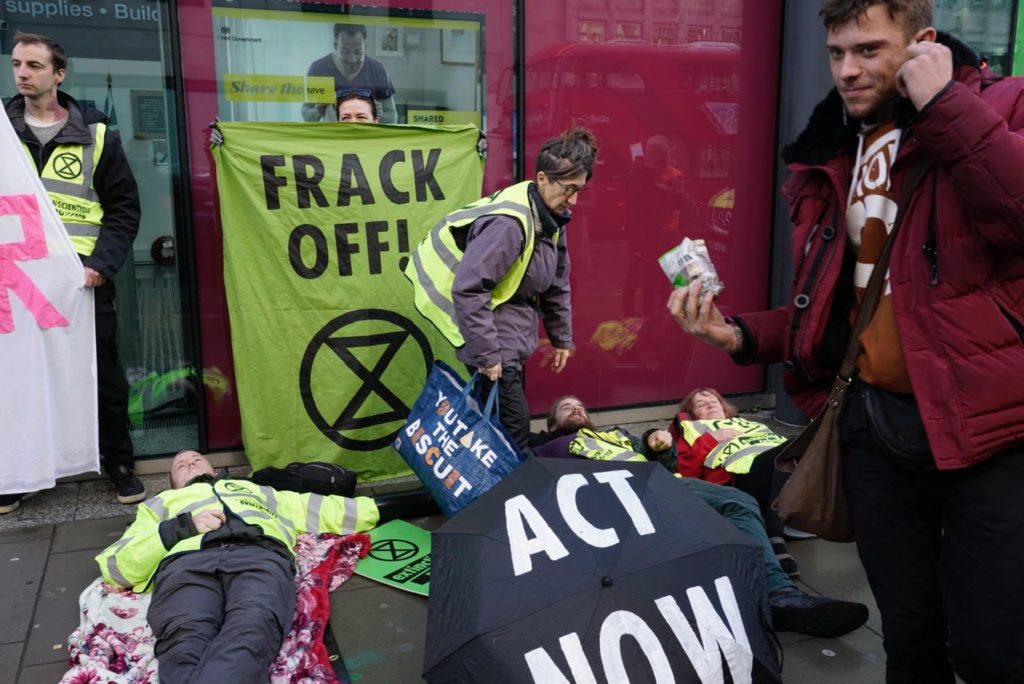
An injunction granted to energy giant Ineos has created an “impermissible severe chilling effect” on campaigners’ right to protest against fracking, the Court of Appeal has heard.
Environmental and human rights campaigners are challenging what they say is a “draconian” injunction, which prevents “persons unknown” from trespassing on or obstructing access to the company’s shale gas sites.
The injunction, granted by the High Court in November 2017, also prevents people from combining together to commit unlawful acts “with the intention of damaging” Ineos or any other companies in its supply chain.
Ineos argues the injunction is intended to only “prohibit unlawful activities” and not “injunct lawful activity”.
But opponents say it is “unprecedented and wide-ranging” and has had “a very serious chilling effect on lawful and legitimate protest activities”.
At a hearing in London on Tuesday, lawyers for Joe Boyd and Joe Corre argued the injunction is “unlawfully, unnecessarily and disproportionately exposing to risk of financial and penal sanction” campaigners who are exercising their “rights to free speech and to protest”.
Heather Williams QC, for Mr Boyd, argued that the judge who granted the injunction “did not distinguish between lawful freedom of expression and assembly … and unlawful activities”.
She said that the supply chain injunction was “a novel, uncertain, unnecessary and disproportionate injunction … which exposes a significant number of people to serious penalties for speech and protest-related activities”.
Ms Williams further argued that anti-fracking campaigners were “protesting on a matter of broad public interest, against what is widely considered to be a harmful activity, in pursuit of the perceived common good”.
Stephanie Harrison QC, for Mr Corre, said that fracking was “highly controversial” and there were “widespread and compelling concerns about its adverse impacts on the environment, climate change and the local communities” in which it was proposed to take place.
She also pointed out that the terms of Ineos’s injunction have since been applied in similar cases involving oil and gas firms Cuadrilla, UK Oil and Gas, Angus Energy and IGas.
Ms Harrison argued that if Ineos’s injunction was upheld, that it was “likely to become the default position in protest cases”.
She added that the “draconian nature of the injunction, the challenges and risks of resisting a powerful multinational company with deep pockets (and) the severe penalties” for breaching the order was a “serious deterrent” to people coming forward to challenge the injunction.
Mr Corre was able to do so, she said, because he is “a man of both principle and means”.
Alan Maclean QC, for Ineos, argued in written submissions that there was “no error of legal principle” in the judgment granting the injunction.
He said Mr Justice Morgan’s approach to the law was “orthodox and correct” and that his decision to grant the injunction was “unimpeachable on appeal”.
Mr Maclean dismissed the contention that the injunction was uncertain, submitting that it “clearly identifies and describes the categories of persons unknown, by reference to the ingredients of the particular wrongs”.
He added: “It prohibits unlawful activity and there is nothing difficult about a would-be protester being in a position to know whether or not he or she is within the scope of the order.”
He also argued that it was appropriate for Ineos to obtain the injunction against “persons unknown”, saying that it would otherwise have had to “‘pick on’ a particular individual or group of individuals”.
In the lunch break, protesters gathered outside the Royal Courts of Justice wearing “devil masks” of Ineos chairman Sir Jim Ratcliffe and holding placards reading “Frack off Ineos”.
Lord Justice Longmore, sitting with Lord Justice David Richards and Lord Justice Leggatt, will hear submissions from the parties over two days and are expected to reserve their judgment.
Recommended for you
